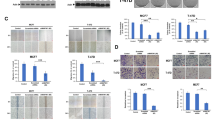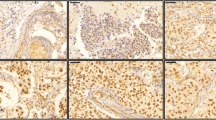Summary
Nuclear metastasis-associated 1(MTA1) protein is an estrogen receptor co-repressor that regulates transcription via chromatin remodeling, and MTA1 messenger ribonucleic acid (mRNA) levels are elevated in several kinds of locally advanced and metastatic tumors relative to non-metastatic tumors. Previous studies in our laboratory mapped MTA1 into a region showing significantly lower LOH (loss of heterozygosity) in primary breast cancers with metastases compared to node-negative tumors, suggesting that epigenetic alterations of MTA1 affect metastatic potential. The present study examined immunohistochemical expression of the MTA1 protein in treated and untreated primary human breast cancers to study the relationship between MTA1 expression and clinical outcome. Node-negative tumors that overexpress MTA1 protein had recurrence risks similar to node-positive tumors. In multivariate analysis of untreated node-negative tumors, highest expression of MTA1 was associated with increased relapse risk (hazard ratio (HR)=2.72, p=0.0003 for multivariate analysis). Tamoxifen and/or anthracylcene-based chemotherapies eliminated all MTA1 associations with clinical outcome, suggesting MTA1 overexpression predicts early disease relapse, but sensitizes breast tumors to systemic therapies.
Similar content being viewed by others
References
O’Connell P, Pekkel V, Fuqua S, Osborne CK, Allred DC, 1994 Molecular genetic studies of early breast cancer evolution Breast Cancer Res Treat 32: 5–12
O’Connell P, Fischbach K, Hilsenbeck S, Mohsin SK, Fuqua SAW, Clark GM, Osborne CK, Allred DC, 1999 Loss of heterozygosity at D14S62 and metastatic potential of breast cancer J Natl Cancer Inst 91: 1391–1397
Martin MD, Fischbach K, Osborne CK, Mohsin SK, Allred DC, O’Connell P, 2001 Loss of heterozygosity events impeding breast cancer metastasis contain the MTA1 gene Cancer Res 61: 3578–3580
Allred DC, Clark GM, Tandon AK, McGuire WL, 1993 Immunohistochemistry on histological sections made from small (50 mg) samples of pulverized breast cancer J Histotechnol 16: 117–120
Lampkin SR, Allred DC, 1990 Preparation of paraffin blocks, sections containing multiple tissues samples using skin punch J Histotechnol 13: 121–123
Harvey JM, Clark GM, Osborne CK, Allred DC, 1999 Estrogen receptor status by immunohistochemistry is superior to the ligand-binding assay for predicting response to adjuvant endocrine therapy in breast cancer J Clin Oncol 17: 1474–1481
Mohsin SK, Weiss H, Havighurst T, Clark GM, Berardo M, Roanh lD, To TV, Qian Z, Love RR, Allred DC, 2004 Progesterone receptor by immunohistochemistry and clinical outcome in breast cancer: a validation study Mod Pathol 17: 1545–1554
Allred DC, Harvey JM, Berardo M, Clark GM, 1998 Prognostic and predictive factors in breast cancer by immunohistochemical analysis Mod Pathol 11: 155–168
Wenger CR, Clark GM, 1998 S-phase fraction and breast cancer – a decade of experience Breast Cancer Res Treat 51: 255–265
Therneau TM, Grambsch PM, 2000 Modeling Survival Data: Extending the Cox Model Springer-Verlag, New York
Grambsch PM, Therneau TM, Fleming TR, 1995 Diagnostic plots to reveal functional form for covariates in multiplicative intensity models Biometrics 51: 1469–1482
Kumar R, Wang RA, Mazumdar A, Talukder AH, Mandal M, Yang Z, Bagheri-Yarmand R, Sahin A, Hortobagyi G, Adam L, Barnes CJ, Vadlamudi RK, 2002 A naturally occurring MTA1 variant sequesters oestrogen receptor-alpha in the cytoplasm Nature 418: 654–657
Toh Y, Pencil SD, Nicolson GL, 1994 A novel candidate metastasis-associated gene, Mta1, differentially expressed in highly metastatic mammary adenocarcinoma cell lines. cDNA cloning, expression, and protein analyses. J Biol Chem 269: 22958–22963
Neri A, Welch D, Kawaguchi T, Nicolson GL, 1982 Development and biologic properties of malignant cell sublines and clones of a spontaneously metastasizing rat mammary adenocarcinoma J Natl Cancer Inst 68: 507–517
Toh Y, Oki E, Oda S, Tokunaga E, Ohno S, Maehara Y, Nicolson GL, Sugimachi K, 1997 Overexpression of the MTA1 gene in gastrointestinal carcinomas: correlation with invasion and metastasis Int J Cancer 74: 459–463
Toh Y, Kuwano H, Mori M, Nicolson GL, Sugimachi K, 1999 Overexpression of metastasis-associated MTA1 mRNA in invasive oesophageal carcinomas Br J Cancer 79: 1723–1726
Iguchi H, Imura G, Toh Y, Ogata Y, 2000 Expression of MTA1, a metastasis-associated gene with histone deacetylase activity in pancreatic cancer Int J Oncol 16: 1211–1214
Sasaki H, Moriyama S, Nakashima Y, Kobayashi Y, Yukiue H, Kaji M, Fukai I, Kiriyama M, Yamakawa Y, Fujii Y, 2002 Expression of the MTA1 mRNA in advanced lung cancer Lung Cancer, 35: 149–154
Sasaki H, Yukiue H, Kobayashi Y, Nakashima Y, Kaji M, Fukai I, Kiriyama M, Yamakawa Y, Fujii Y, 2001 Expression of the MTA1 mRNA in thymoma patients Cancer Lett 174: 159–163
Hofer MD, Kuefer R, Varambally S, Li H, Ma J, Shapiro GI, Gschwend JE, Hautmann RE, Sanda MG, Giehl K, Menke A, Chinnaiyan AM, Rubin MA, 2004 The role of metastasis-associated protein 1 in prostate cancer progression Cancer Res 64: 825–829
Bagheri-Yarmand R, Talukder AH, Wang RA, Vadlamudi RK, Kumar R, 2004 Metastasis-associated protein 1 deregulation causes inappropriate mammary gland development and tumorigenesis Development 131: 3469–3479
Chang JC, Wooten EC, Tsimelzon A., Hilsenbeck SG, Gutierrez MC, Elledge R, Mohsin S, Osborne CK, Chamness GC, Allred DC, O’Connell P, 2003 Gene expression profiling for the prediction of therapeutic response to docetaxel in patients with breast cancer Lancet 362: 362–369
Acknowledgements
The authors thank Drs Gary Chamness and Jenny Chang for critical reading of the manuscript. This report was supported by Grants CA30195 and CA58183 from the National Cancer Institute, National Institutes of Health, Department of Human Services, and USAMRC Breast Cancer Training Grant, DAMD-17-99-1-9047873. This study was conducted under the aegis of Baylor College of Medicine Institutional Review Board Protocol 47830.
Author information
Authors and Affiliations
Corresponding author
Additional information
Address for offprints and correspondence: Peter O’Connell, Department of Human Genetics, VCU School of Medicine, 1101 East Marshall Street, P.O. Box 980033, Richmond, Virginia 23298-0033, USA; Tel.: +1-804-828-9632, Ext. 240; Fax: +1-804-828-3760; E-mail: poconnell@vcu.edu
Rights and permissions
About this article
Cite this article
Martin, M.D., Hilsenbeck, S.G., Mohsin, S.K. et al. Breast tumors that overexpress nuclear metastasis-associated 1 (MTA1) protein have high recurrence risks but enhanced responses to systemic therapies. Breast Cancer Res Treat 95, 7–12 (2006). https://doi.org/10.1007/s10549-005-9016-8
Accepted:
Published:
Issue Date:
DOI: https://doi.org/10.1007/s10549-005-9016-8




